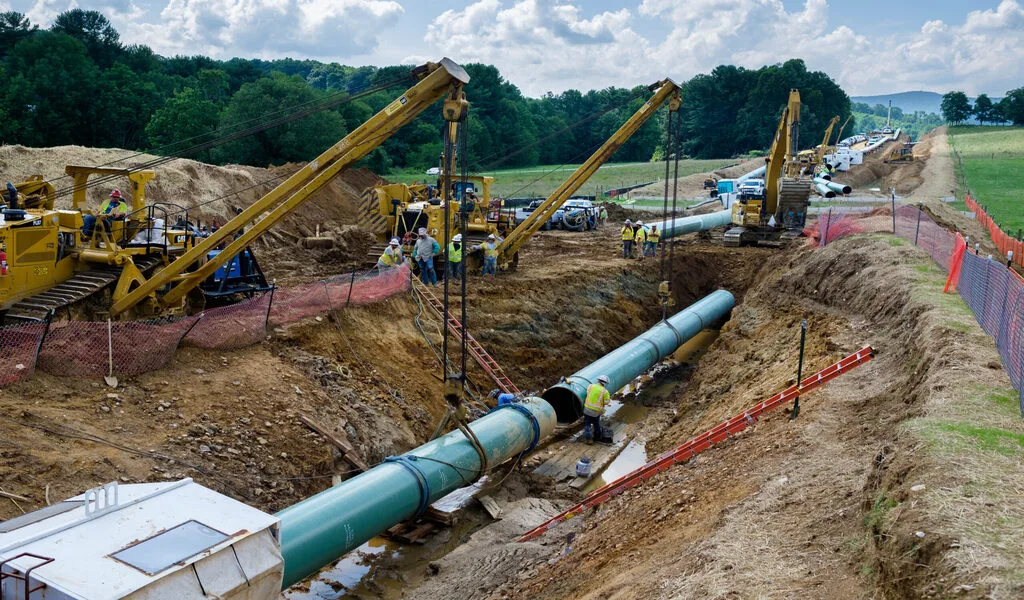News
Federal Appeals Court Dismisses Challenge to Controversial Gas Pipeline Construction

(CTN News) – In a significant legal development, the 4th U.S. Circuit Court of Appeals has ruled to dismiss a challenge against the construction permits for a contentious natural gas pipeline in Virginia and West Virginia.
This decision comes after Congress, as part of a bipartisan bill aimed at increasing the debt ceiling, mandated the continuation of the project.
Pipeline Advocates’ Arguments and Jurisdiction Shift
The court’s decision, which aligns with the arguments by lawyers representing the Mountain Valley Pipeline, marks a turning point in the legal battle initiated by environmental groups concerned about the pipeline’s potential impact on endangered species, erosion, and stream sedimentation.
The U.S. Supreme Court’s recent decision to allow the resumption of construction was pivotal in this case. Despite prior obstruction by the 4th Circuit, the project’s approval was compelled by Congress and subsequently signed into law by President Joe Biden in June.
Lawyers advocating for the pipeline asserted that Congress held the authority to remove jurisdiction over the case from the 4th Circuit.
They further contended that any discussion regarding the law’s constitutionality should be handled by an appellate court in Washington, as specified by the legislation passed by Congress.
In explaining the ruling, appeals judge James Wynn emphasized the impact of the new legislation on the case. He stated, “Armed with this new legislation enacted specifically in their favor, Respondents — the federal agencies and the Mountain Valley Pipeline — moved in this Court for the dismissal of the petitions. Upon consideration of the matters before us, we must grant Respondents’ motions to dismiss.”
Shaping the Future of the Gas Pipeline Project
Various environmental groups have voiced opposition to the $6.6 billion pipeline project. The project, designed to address escalating energy demands in the South and Mid-Atlantic regions, involves gas transportation from the Marcellus and Utica fields in Pennsylvania and Ohio.
The court’s decision is expected to have far-reaching implications for the future of the project and the ongoing dialogue surrounding its environmental implications.
4th U.S. Circuit Court of Appeals
The 4th U.S. Circuit Court of Appeals is one of the thirteen federal appellate courts in the United States. It is located in Richmond, Virginia, and has jurisdiction over federal cases from the states of Maryland, Virginia, West Virginia, North Carolina, and South Carolina.
The U.S. Court of Appeals for the Fourth Circuit hears appeals from federal district courts within its jurisdiction and also handles certain specialized cases, such as those involving federal administrative agencies. It is one step below the U.S. Supreme Court in the federal judicial hierarchy.
The court is composed of a panel of judges who review the decisions made by lower courts to determine whether legal errors were made or whether the law was correctly applied. The decisions made by the Fourth Circuit are binding precedent within its jurisdiction and can influence legal interpretations in its area.
Like other federal circuit courts of appeals, the Fourth Circuit plays a crucial role in shaping the interpretation and application of federal law in its region.
The Mountain Valley Pipeline
The Mountain Valley Pipeline (MVP) is a natural gas pipeline project in the United States. It is designed to transport natural gas from production areas in the Appalachian region, primarily in West Virginia, to delivery points in Virginia. The pipeline is being developed by a consortium of energy companies, including EQM Midstream Partners, NextEra Energy, Con Edison Transmission, WGL Midstream, and RGC Midstream.
The MVP project has been met with both support and opposition, largely due to its potential environmental and social impacts. Supporters argue that the pipeline will contribute to energy infrastructure and economic development in the region, providing a reliable supply of natural gas. Opponents, on the other hand, raise concerns about the potential for water pollution, disruption to ecosystems, and safety risks associated with pipeline construction and operation. Additionally, there have been legal and regulatory challenges to the pipeline’s construction due to permit issues and environmental violations.
The construction of the MVP has faced delays and controversies since its inception. Legal challenges and regulatory hurdles, including permit revocations, have slowed down progress. As of my last knowledge update in September 2021, the project was facing ongoing scrutiny and uncertainty. I recommend checking more recent and reliable sources for the latest developments on the Mountain Valley Pipeline.































